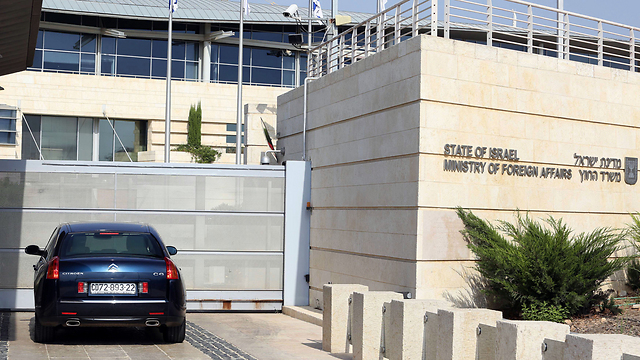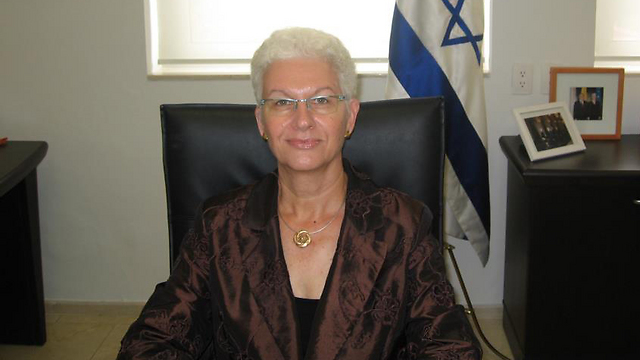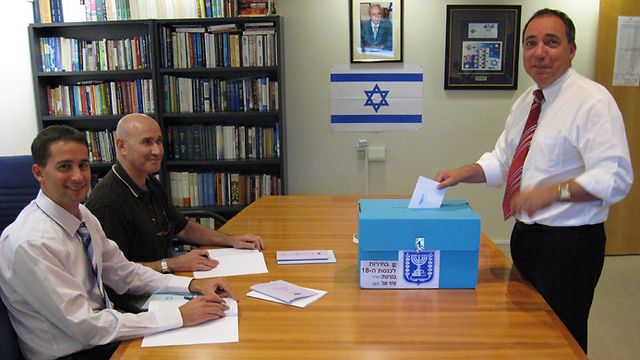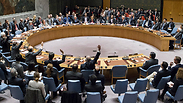
UN Security Council voting against Israel
צילום: AP
Inside Israel's Christmas reprimands of foreign diplomats
An enraged Foreign Ministry disrupts the holiday for the representatives of those countries who voted against Israel in the UN Security Council; adding insult to injury, small talk is dispensed with, no national flags are displayed, and refreshments aren't even offered; find herein a glimpse into the machinations of the biggest simultaneous scolding the MFA has ever had to administer.
It was assuredly one of the busiest days in the annals of Israel's Ministry of Foreign Affairs (MFA). Never before in the State of Israel have so many ambassadors been simultaneously summoned in such aggravated circumstances, and from friendly countries at that.
One after another, representatives of ten countries were called in for formal reprimands following their governments' votes in favor of UN Security Council Resolution 2334 that infuriated Jerusalem by coming out against Israel's settlement construction. Of the ten representatives summoned, only three were ambassadors—all the others sent the "Number 2"s from their Tel Aviv embassies, with the Number 1s enjoying Christmas abroad and watching the diplomatic melodrama unfold from afar.
The representatives summoned were those of Angola, China, Egypt, France, Japan, Russia, Spain, the UK, Ukraine, and Uruguay. Those countries supported the resolution, while those four that actually submitted the accepted resolution don't have representatives in Israel: Malaysia and Venezuela don't have diplomatic relations with the Jewish state, and the ambassadors from Senegal and New Zealand are non-resident.
And so it came to be that this whole hubbub fell on the supporting characters in the affair. That said, Israel was very aware that Britain was extremely active behind the scenes and that it was Egypt that submitted the original draft resolution that was withdrawn after US President-elect Donald Trump and Prime Minister Benjamin Netanyahu applied massive pressure on Egyptian President Al-Sisi.
Each conversation lasted ten minutes. The ambassador or the stand-in diplomat was received by the deputy director general responsible for their country and by the department director. The representative was taken to a meeting room in each branch. With a necessary handshake but without small talk—no comments on the weather, cultural discussions or just personal courtesies—which, in the diplomatic world, is understood to be a display of anger.
And if the verbal snub were insufficient, the diplomats weren't offered any refreshments, not even a glass of water. They could also forget about a flag from their country being displayed. However, to avoid repeating the infamous incident with the dressing down of the Turkish ambassador in 2010, the press corps was not assembled, and the ambassadors were chastened on Christmas morning on chairs of the same height as those with whom they were meeting.
The issue of summoning the diplomats on one of the Western Christian calendar's holiest days became a mini-diplomatic incident of its own. According to one version from the MFA, the timing was deliberately ordered from above to cause maximum annoyance. According to another version, however, it wasn't necessarily on purpose—it simply was the first working day in Israel after the controversial resolution, and there was no reason to delay summoning the representatives.

The infamous reprimand with the then-Turkish ambassador seated on a lower sofa than the Israelis in 2010 (Photo: Gil Yohanan) (צילום: גיל יוחנן)
Either way, nearly all those who were rebuked protested that they had been summoned on Christmas. One of them angrily said, "If you were called on Shabbat or Yom Kippur, would you come?" However, senior diplomats say in reply, "If they slap Israel in the face on Christmas Eve, they can't complain when they get summoned for a reprimand on Christmas Day."
Some of the diplomats tried to get out of having to attempt the meeting for a variety of excuses. Some claimed that they were in the midst of a trip somewhere in the country, but the MFA didn't cave and insisted that they arrive that very day. The Spanish ambassador tried to raise the banner of revolt from his vacation abroad, ordering his deputy by telephone not to come. However, when the deputy discovered that the rest of his European peers would be presenting themselves, Madrid took the decision to get in line with the others, and the deputy did show up.
Russia's ambassador, however, was not outraged at all by the December 25 summons. This is because the Eastern Christian Church celebrates the birth of Jesus on January 7 in keeping with the older Julian calendar. It may also be more evidence of a diplomatic spring between the Putin administration and Jerusalem.
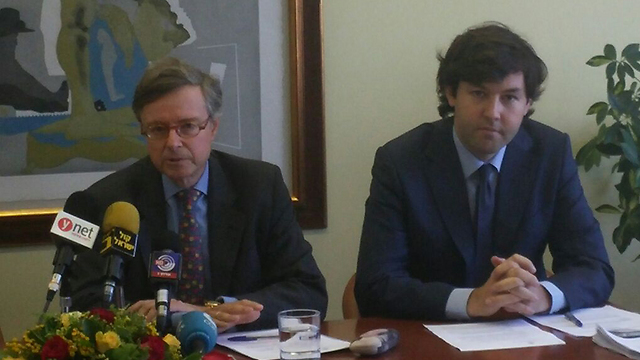
The Spanish ambassador (L) who tried to raise the banner of revolt from abroad (Photo: Barel Efraim) (צילום: בראל אפרים)
As regards relations with the Obama administration, on the other hand, the winter has never been more frozen. US Ambassador Dan Shapiro received special treatment: He was summoned separately to meet with the prime minister. Initial reports termed that a reprimand as well, but the Prime Minister's Offic rushed to qualify slightly: It was a clarifying discussion. Officially, the United States was the only country that abstained in the vote, but, then again, it didn't cast the veto that Israel so desperately needed and was even perceived by Jerusalem as having orchestrated the move.
So what was said in the meetings? In each reprimand, the relevant jurisdiction's deputy director general read a set message formulated in coordination with the Prime Minister's Office. The text was repeated with minor changes here and there.
To give one example, the reprimand of the Spanish ambassador's deputy, according to records obtained by Yedioth Ahronoth, was delivered by the deputy director general for Western Europe in the MFA, Dr. Rodica Radian-Gordon. She opened the meeting by expressing deep anger with the resolution. She added that even if there are disagreements between friendly countries, they don't go to the Security Council. She further stated that the resolution was seen as that institution's moral bankruptcy and revealed the duplicity of its members.
Radian-Gordon also emphasized that the new administration in Washington is expected to express completely different views. The resolution runs contrary to the Quartet's position in advocating direct and fair negotiations and only makes it easier on the Palestinians not to return to the negotiating table, the deputy director general emphasized.
In every one of the ten reprimands, the door "suddenly" opened and either the MFA's then-interim director general Yuval Rotem (who was appointed to permanently fill the position on Thursday) or the ministry's political director Alon Ushpiz would enter. Rotem or Ushpiz would then add further Israeli protest in the name of the prime minister and the government with the same message: Jerusalem is angry.
All the summoned diplomats took notes and said that they would convey the messages. Most of them asked not to respond on the spot and, at most, made due with protesting the timing.
Opinions in the MFA of Netanyahu's frenzy are divided: Some of the diplomats agree that a serious act took place that justified such a response. One ministry official said, "They put a mine in that resolution that says that anything beyond the Green Line is illegal. This will harden Palestinian positions, and now they'll also insist on an Israeli withdrawal from settlement blocs and neighborhoods in Jerusalem that are beyond the '67 lines: Ramot, Gilo, Pisgat Ze'ev and more. This will render the conflict insoluble."
On the other hand, other officials say that Netanyahu is seriously damaging the ability of those countries to work with Israel in following votes. The preceding Friday night saw senior officials in the ministry attempting to stop any far-reaching reciprocal measures put forward by Netanyahu's people, some even bordering on a break in diplomatic relations. This is particularly relevant to the two countries who submitted the resolution and with whom we have diplomatic relations, New Zealand and Senegal.
In New Zealand, the crisis reached the front pages, and the Jewish community there already reached out to Israel asking it not to close its embassy, which is one of the most active in providing assistance to Israeli travelers.
Regarding Senegal, as well, there are currently doubts about downgrading relations, and in the interim it was decided to cease the massive aid operations from Mashav (Israel's agency for international development cooperation run by the MFA). One Senegalese newspaper headlined an article, "Senegal at war with the Jewish state."










